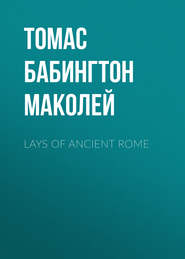По всем вопросам обращайтесь на: info@litportal.ru
(©) 2003-2024.
✖
Critical and Historical Essays. Volume 3
Настройки чтения
Размер шрифта
Высота строк
Поля
Not a traitor, 337.
His character, ii. 23.
His diary, 24.
His impeachment and imprisonment, 37.
His rigor against the Puritans, and tenderness towards the Catholics, 41.
Laudohn, an Austrian general, beats Frederic at Hochkirchen, iii. 319 (#x9_x_9_i49).
At Kunersdorf, 322 (#x10_x_10_i2).
Defeated at Lignitz but takes Schweidnitz, 325 (#x10_x_10_i6).
Lawrence, Major, his early notice of Clive, ii. 678.
Legerdemain, ii. 372.
Legge, Right Hon. H. B., ii. 264.
His dismissal, 265.
His return to the Exchequer, 268.
Legislation, comparative views on, by Plato and by Bacon, ii. 463.
Lennox, Charlotte, ii. 518.
Letters of Phalaris, ii. 592-596.
Liberty, its excesses, the reaction from tyranny, i. 119.
Cause of, espoused by Puritans, 132.
Maintained in the Italian towns of the Middle Ages, 145.
Its character in small states, 252.
Lingard, Doctor, his account of the treatment of Lord Rochester by James II., ii. 332.
His ability as an historian, 533.
His strictures on the Triple Alliance, 533.
Literature, rise of, in Italy, i. 148.
General consideration of the progress of, 190 et seq.
What epochs favorable to masterpieces, 190.
Influence of the critical faculty, 192.
Effect of technical skill, 198.
Rise of good imitative literature, 203.
Theories of, confirmed by history, 204.
Literature, English, its quibbling character during James I.'s reign, i. 205.
Patronage of, 547.
Superseded by a system of puffs, 549.
Revival of, 591.
Encouragement of, by court favor, 718.
Patronage discontinued by Walpole, 719.
Livy, as an historian, graceful but untruthful, i. 258.
Locke, John, Sadler not comparable to, i. 657.
Lollards, iii. 13 (#x1_x_1_i57).
London, in the 17th century, ii. 47.
Devoted to the national cause, 48.
Its public spirit, 77, 78.
Its prosperity during the ministry of Lord Chatham, 279.
Conduct of, at the Restoration, 316.
Effects of the Great Plague upon, 525.
Longinus, criticism of his work on the Sublime, i. 42.
Louis XIV., his character and person, ii. 113-115.
His conduct in respect to the Spanish succession, 140, 141, 149.
His acknowledgment of James II.'s son as King of England, and its consequences, 152.
Sends an army into Spain to the assistance of his grandson, 158.
Другие электронные книги автора Томас Бабингтон Маколей
Lays of Ancient Rome




 4.67
4.67












